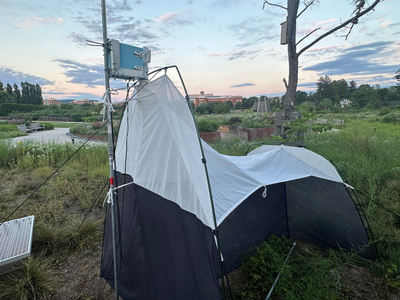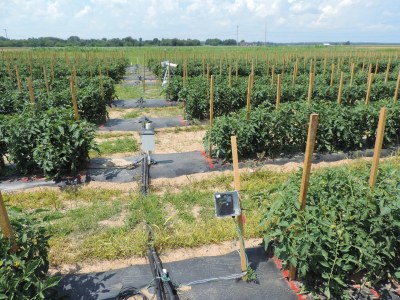Developing and testing emerging and advanced technologies from the lab to the field.

Individuals in greenhouse
A balanced approach
Agricultural systems today are deeply interconnected with natural and engineered systems, facing pressures from climate challenges, resource depletion, and biodiversity losses. Emerging and advanced technologies present opportunities to build a new vision of agroecosystems that balance intensified production with conservation, increased profitability with responsibility, and improved resiliency with mitigation. The TALiS initiative organizes research expertise to address the needs of different sectors and industries ind. It supports a holistic approach to the interconnections of technologies and their impacts on supply chains, communities, livelihoods, worker safety, and ecologies.
What we do
- Leverage technology, artificial intelligence, modeling, and data visualization (including artificial and immersive realities) to support human decision-making
- Study the challenges that face farms, forests, wetlands, waterways, and cities
- Improve resiliency of our crops, forests, and community health
- Promote biodiversity to sustain ecosystem services, enhance resilience to environmental change, and support long-term ecological and human well-being
- Co-develop projects with our stakeholders and focus on scales that align with our unique landscapes
Research Areas

Livestock and wildlife monitoring
Harnessing cutting-edge technologies to revolutionize livestock and wildlife monitoring. By deploying sensors, GPS tracking, and data analytics, we are enhancing animal health, optimizing resource use, and ensuring livestock security. Simultaneously, we are tracking wildlife movements and studying habitats to bolster conservation efforts. These initiatives drive agricultural productivity and sustainability while promoting biodiversity and natural resource conservation.

Insect population and community monitoring
Transforming insect population and community monitoring through innovative technologies. By using advanced sensors and data analytics, we are tracking insect behaviors and population dynamics, enabling early detection of pest outbreaks and promoting ecological balance. These efforts enhance agricultural productivity, safeguard crops, and support biodiversity, driving sustainable farming practices and environmental conservation.

Plant disease monitoring
Revolutionizing plant disease monitoring with cutting-edge technologies. By using advanced sensors and data analytics, we are detecting and tracking disease outbreaks in real-time, enabling swift intervention and prevention. These efforts safeguard crop health, boost agricultural productivity, and promote sustainable farming practices, ensuring a resilient and thriving agricultural ecosystem.

Robotics for management and harvesting
Pioneering the use of robotics for management and harvesting, transforming agricultural practices. By deploying advanced robotic systems, we are automating tasks such as planting, tending, and harvesting crops, enhancing efficiency and precision. These innovations reduce labor costs, increase productivity, and promote sustainable farming, ensuring a resilient and thriving agricultural ecosystem.

Controlled environment agriculture
Advancing controlled environment agriculture to optimize crop production. By using state-of-the-art technologies, we are creating ideal growing conditions, regulating climate variables, and monitoring plant health. These innovations enhance yield, reduce resource use, and promote sustainable farming practices, ensuring a resilient and efficient agricultural system.

Habitat quality monitoring
Enhancing habitat quality monitoring through innovative technologies. By deploying advanced sensors and data analytics, we are assessing environmental conditions, tracking changes, and identifying areas needing conservation. These efforts support biodiversity, improve ecosystem health, and promote sustainable land management, ensuring a thriving natural environment.

Modeling for crop management
Advancing crop management and conservation through sophisticated modeling techniques. By using predictive models and data analytics, we are optimizing planting schedules, resource allocation, and pest control strategies. These efforts enhance crop yields, reduce environmental impact, and promote sustainable farming practices, ensuring a resilient and efficient agricultural system.

Decision support tool development
Driving innovation in decision support tool development to enhance conservation efforts. By creating advanced analytical tools, we are empowering farmers and land managers to make informed decisions about resource use, crop management, and environmental protection. These tools improve efficiency, promote sustainable practices, and ensure the long-term health of agricultural and natural ecosystems.
Director, TALiS
- Professor of Agricultural and Biological Engineering
- Email hzh@psu.edu
- Office 814-865-2633
Director, TALiS
- Professor of Agricultural and Biological Engineering
- Email hzh@psu.edu
- Office 814-865-2633

